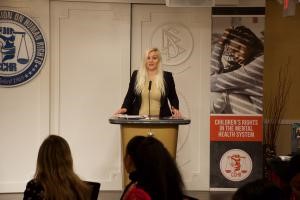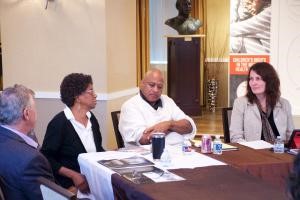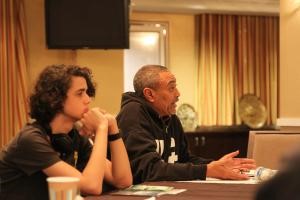After new allegations of abuses at Saint Elizabeths Hospital surface, citizens air concerns about violations of children’s rights in the mental health system.
In observance of the 30th Anniversary of the UN Convention on the Rights of the Child, the Citizens Commission on Human Rights sponsored a pop-up exhibit on mental health rights and a community roundtable discussion on the current state of the rights of children in the mental health system. This was the first in a series of roundtables held at the Church of Scientology in Washington, DC, on parents and children protecting their mental health rights.

Isabelle Vladoiu, a legal and human rights scholar, discussed the U.N. Convention on the Rights of the Child, including Article 12, which states that children have the right to say what they think should happen when adults are making decisions that affect them and to have their opinions taken into account.

Children have been involuntarily subjected to psychiatric practices and drugs, including electroshock treatments that cause brain damage and behavioral drugs that cause side effects like tardive dyskinesia (permanent uncontrolled jerking movements), deepening depression, aggression and even suicidal thoughts and actions.
“Contrary to Victorian values, children actually should be seen and should be heard. Members of the community and parents should be heard. Children should not be forced, coerced or manipulated into treatments that will affect their body and their mind for years to come,” said roundtable moderator Beth Akiyama, of the National Office of the Citizens Commission on Human Rights.
The roundtable was held on the heels of an exposé revealing the excessive use of restraints and seclusion at Saint Elizabeths psychiatric hospital in Washington, DC. According to the hospital’s own internal audit, the use of restraints went from four times in 2013 to 782 times in 2018. The total time patients spent in seclusion increased from 49 hours in 2012 to 391 hours in 2018. Saint Elizabeths had been placed under U.S. Department of Justice (DOJ) oversight after an investigation in 2007 revealed many patient assaults and civil rights violations. DOJ’s oversight ended in 2014 after patient care was improved. Now, the revelation of these new abuses seriously calls into question the facility’s ability to operate safely under its own governance.

Roundtable attendees were asked what issues they have found in their own communities. Concerns raised about children’s rights in the mental health system included not only psychiatric facilities, but also the foster care system and the mental health systems in schools. Other points included the role of the media in promoting psychiatric drugs on TV, which creates demand for them in young people. Specially trained Crisis Intervention Officers in the District of Columbia were applauded as a great help in successfully handling stressful mental health situations in the community. One resident noted that in the poorest and most dangerous part of the city, some children are born on drugs and into families with generations of illegal and prescription drug use.

Concurrent with the roundtable was an informative pop-up exhibit exposing the history of abuses in the mental health system. This exhibit has been displayed internationally for over a decade to raise awareness of the potential for abuse in the mental health system so citizens can protect themselves.
The Citizens Commission on Human Rights is a nonprofit charitable mental health watchdog group co-founded in 1969 by the Church of Scientology and professor of psychiatry Dr. Thomas Szasz. It is dedicated to eradicating psychiatric abuse and ensuring patient protection. With headquarters in Los Angeles, California, CCHR International guides a global human rights advocacy network of some 180 chapters across 34 nations. CCHR Commissioners include physicians, psychiatrists, psychologists, lawyers, legislators, government officials, educators and civil rights representatives.

